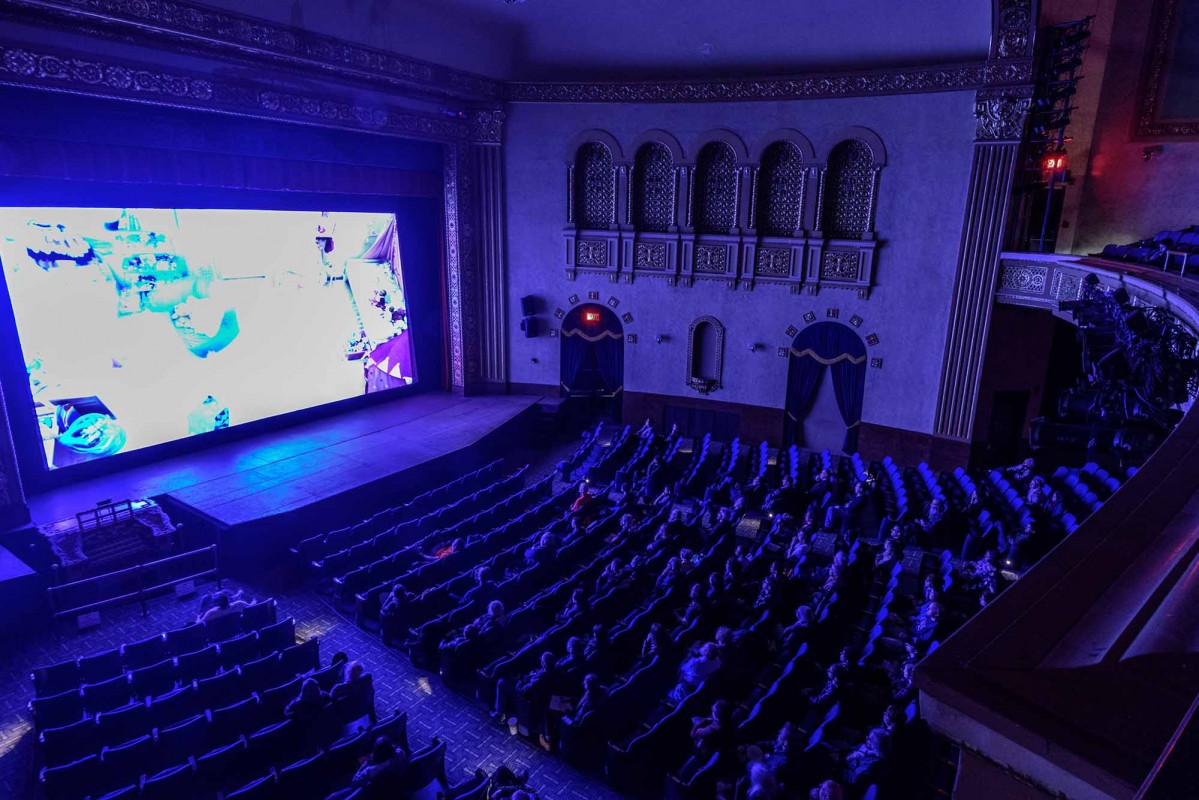Round one: Cinema students to evaluate films for famous festival

The Ann Arbor Film Festival (AAFF) draws thousands of entries from independent filmmakers eager to share their surreal vision. It’s the oldest experimental film festival in the world, and winning films typically go on tour to art galleries, universities and theaters around the world.
Now, for the first time, Binghamton University cinema students will have a hand in picking the winners. The festival reached out to Binghamton University’s Cinema Department, giving them the opportunity to review films under consideration for the 59th annual event.
“Our department is known for avant-garde, experimental cinema. It’s similar to what they do at the festival,” said Associate Professor and Chair of Cinema Tomonari Nishikawa.
Students in Nishikawa’s CINE 122: Expression and Innovation in Film and Video are reviewing 22 short films this fall. Also reviewing films are students in Professor Ariana Gerstein’s CINE 252: Video and Filmmaking I and CINE 250: Animation classes.
CINE 122 is a lecture course that focuses mainly on experimental cinema, more typically available in museums, galleries and film festivals than on television or in the multiplex. Divided into groups, students will watch and discuss the films, deciding which ones will move on to the second round of screenings. It’s only a small portion of the 3,000 to 5,000 submissions the festival typically receives, Nishikawa acknowledged.
“The films come from all over the world,” he said.
Students are evaluating the films based on originality, technical quality, artistic vision, “compellingness” and sound design, explained sophomore Lora Kaganovsky, a student in CINE 122. After a discussion, they rate the film on a five-star scale.
It’s fascinating work, but it’s also difficult, Kaganovsky said.
“It seems almost presumptuous to judge someone’s artistic vision, which is why it’s important to have lots of different categories and multiple people giving their opinion. If it was just one person in charge of selecting movies, that wouldn’t be fair at all,” she reflected. “There were so many instances where something someone else said would make me think about the film differently, and I think that’s one of the coolest things about art.”
The class discussions have prompted Hadar Arens, a senior psychology major and cinema minor in the animation class, to think more critically about her own work, especially on the technical and artistic side. The experience also makes her more appreciative of the time and dedication behind the artistic process.
“Since festivals receive so many submissions it feels meaningful to take a small part in something larger than us,” Arens said. “I feel that our voice and opinion is appreciated and taken into account, even as undergraduates still learning about film and animation.”
Cinema success at AAFF
The 2021 Ann Arbor Film Festival will run from March 23 to 28 online.
Cinema faculty have shown their own work repeatedly through the years at the famed festival, as well as served in other roles. Nishikawa served as a 2010 festival juror, and presented screening programs for the festival’s 50th anniversary in 2012.
- Gerstein’s film “Traces with Elikem” received the Peter Wilde Award for Most Technically Innovative Film at the 2019 festival; her film “Images of Flying and Falling” also won the Gus Van Sant Award for Best Experimental Film in 2002.
- Professor Vincent Grenier showed “Honey Moon Lane” in 1973 and “Straight Lines” in 2010, received the Michael Moore Award for Best Documentary for “Out in the Garden” in 1992 and second prize for “World in Focus” in 1978.
- Lecturer Daïchi Saïto has received Best of the Festival Award for his “Trees of Syntax, Leaves of Axis” in 2010 and Best Experimental Film Award for “Engram of Returning” in 2016.
- Associate Professor Monteith McCollum has shown several projects, including his performance piece “In a Free Sound Field” last year. He won Best of Festival for his feature documentary “Hybrid” in 2002.
- Lecturer Benjamin Ogrodnik presented films from the 2018 AAFF at the 3 Rivers Film Festival, where he worked as a film curator in 2019.

